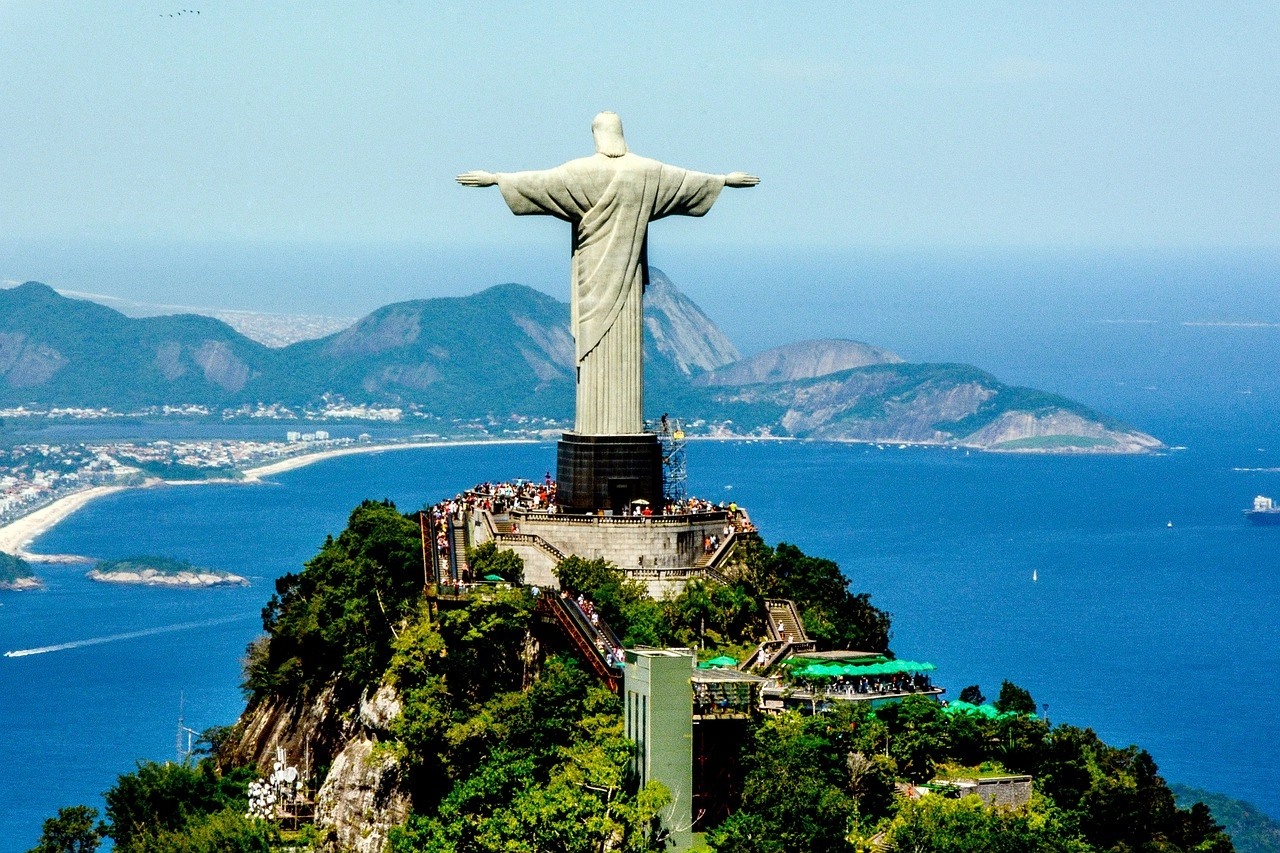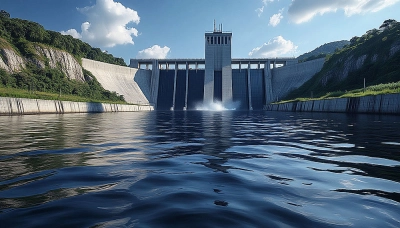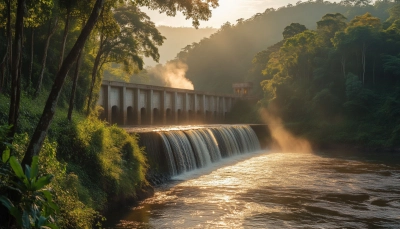Brazil
Brazil is the largest country in South America both in terms of area and population. The state stretches from the Amazon River in the north to vineyards and huge Iguazu Falls in the south, washed by the Atlantic Ocean from the east.
The official name of the state — Federative Republic of Brazil. It occupies an area of 8,514,880 km² (5th in the world). The population of the state is approximately 218,137,300 people (as of the beginning of 2023).
Today, according to ethnicity, the composition of the Brazilian population is distributed as follows: 47% — white, 43% — mixed race, 7% — negroid race, 0.58% — Asians, 0.28% — Indians. A large proportion of the population in the country are mestizos.
Brazil — the only Portuguese-speaking country in all of the Americas. The official language of the country is Portuguese, Spanish is widely spoken, French, German, Italian are also used. In the hinterland, "lingua geral" is commonly used; — a common language that arose on the basis of the languages of the Tupi-Guarani Indian tribes, as well as 180 different languages and dialects of ethnic groups.
The majority of Brazilians are Christians (88.9%). Of these, 64.6% are members of the Roman Catholic Church, making Brazil the largest Catholic country in the world. The state also has a number of Catholic churches that have broken off relations with Rome; The largest of these organizations is the Brazilian Catholic Apostolic Church. Non-religious and atheists make up 7.9% of Brazilians, there are also Muslims and representatives of other religious groups. Slaves taken out of Africa brought African cults to Brazil. For centuries, these cults were intertwined with Catholicism, spiritualism and local Indian beliefs, turning into new syncretic religions.
The official currency of the country is the Brazilian real.
Brazilia — the capital of the Federative Republic of Brazil, is the third largest city in the country. Together with Anapolis (139 km) and Goiania (209 km), it makes up the axis "Brazilia — Anapolis — Goiania", which is the most developed region of the Central-Western region. Also the largest cities of the country — Sao Paulo, Rio de Janeiro, Salvador, Fortaleza.
Administratively, the country is divided into 26 states and 1 federal (capital) district.
Before the arrival of Europeans, Brazil was inhabited by Indian tribes. The modern history of Brazil began in 1500, when the Portuguese fleet headed by Pedro Alvares Cabral sailed to the shores of this country. The first Portuguese settlement in Brazil appeared in 1532, and the colonization of this country actually began in 1534.
In 1549, the Brazilian colonies were united into a single governor-general. By the middle of the 16th century, Brazil had become the world's largest supplier of sugar. To grow sugar cane, they began to import black slaves from Angola and Mozambique.
In 1640, the Marquis de Montalvan became the first Viceroy of Brazil. By the end of the 17th century, sugar exports from this South American state declined markedly. However, by that time large reserves of gold had been found in the country.
In 1822, Brazil declared independence from Portugal — the Brazilian Empire was formed, headed by Emperor Pedro I. Slavery in the country was abolished only in 1888. And in 1889, the Republic of Brazil was proclaimed.
In 1930, Getúlio Vargas became President of Brazil, who introduced a dictatorship in the country. In 1954, the top officers of the Brazilian army carried out a coup, and Marshal Humberto Castelo Branco actually came to power. The capital of the country was moved from Rio de Janeiro to Brasilia. In 1964, another military coup took place, and the next five presidents of the country were military. It was not until 1974 that democratic changes began to take place. In 1967, the country was renamed the Federative Republic of Brazil.
Now the country is the political and economic leader in South America.
In the north, Brazil borders on Guyana, Venezuela, Suriname, French Guiana, in the northwest — with Colombia, in the west — with Peru and Bolivia, in the southwest — with Paraguay and Argentina, in the south — with Uruguay. From the east it is washed by the Atlantic Ocean, in which it owns several islands (the most important — Fernando de Noronha).
The main part of the territory is located on the Brazilian Highlands. To the north of it is the Amazonian lowland. The strip along the Atlantic coast, the width of which decreases from south (80 km) to north (16 km), is occupied by the coastal plain. On the ocean side, it is surrounded by sandy beaches, lagoons and swamps.
Brazil is rich in natural resources. Among them, an exceptionally important place is occupied by forest resources — humid equatorial forests. They account for about 2/3 of the country's territory. In terms of hardwood reserves, Brazil ranks first in the world.
Brazil occupies one of the leading places in the world in terms of cultivated land. Fertile lands are found in river deltas in the Brazilian Plateau.
Water resources are represented by the system of the largest rivers — Amazons, Uruguay and Parana with their tributaries. The rivers of the Brazilian Plateau have significant hydropower potential.
Modern Brazilian society was formed as a result of the merging of representatives of many cultures. That is why Brazilian culture is so diverse and interesting.
For example, the samba dance is known all over the world. It remains the most popular form of folk music for many Brazilians today. And football has already become a real religion for the vast majority of the country's inhabitants.
Each year at the end of February, before Lent, many Brazilian cities hold the Carnival, which is considered the most grandiose show in the world. The cities of Rio de Janeiro and Salvador are especially famous for their parades, the organizers of which spend several months annually preparing.
There are many architectural monuments in the country. The historical quarters of the city of Ore Preto have been carefully restored and are now protected as a national treasure of Brazil and a monument of world importance. In the capital — Itamaraty Palace, the Cathedral, the Museum of Modern Art, the Indian Museum, the Ethnographic Museum and many others. The symbol of Rio de Janeiro is Mount Corcovado with a statue of Christ the Savior.
Also in the cities of the country there are special, unique to Brazil, quarters — favelas. Favelas can be found in a wide variety of areas, even in relatively wealthy ones. Officially — it is a squatter, a group of houses erected on unauthorized plots of land, usually on a hill, near a large construction, some of the materials of which are used to build houses in the favelas.
In fact, everything is somewhat more complicated. The Brazilian favela is not just a village — it is a way of life, a state within a state. An outsider won't walk a step there freely, but many local travel companies organize tours of the favelas.
In the traditions and mentality of the inhabitants of Brazil, a mixture of races and nationalities is felt. Portuguese, African and Indian roots are manifested in the traditions and lifestyle of the inhabitants of a sunny country. Brazilians — emotional, cheerful, smiling and sympathetic people. A foreigner is immediately accepted into the company as if they were one of their own.
When it comes to business communication, Brazilians prefer face-to-face meetings over written communication as it allows them to get to know the person they will be doing business with. Also, Brazilians strictly advocate the correct execution of legal documents.
Businesses in a country tend to be hierarchical, which means that decision making — it is the responsibility of those in the highest positions. Defining roles is essential in Brazil and it is encouraged that people are selected for positions based on their experience. Therefore, it is not recommended to consult with people in lower positions, as this may raise the question of whether you have the required qualifications.
Business practices may vary by region. Businesses that are based in big cities tend to be more internationally collaborative and are more likely to be less patriarchal.
It should also be noted that punctuality is not accepted in Brazil. Business meetings are a must and can often be scheduled ahead of time; however, it is best to schedule them 2-3 weeks in advance. Confirm the meeting in writing. They are often canceled or changed at the last minute.
Brazil's form of government is a presidential republic. The President of the Republic is the head of state, head of the executive branch and commander in chief. The President and Vice President are elected by direct universal suffrage for a term of 4 years (with the right to one re-election).
The highest legislative body is the National Congress, which consists of two chambers: the Federal Senate (81 seats) and the Chamber of Deputies (513 seats).
Brazil is one of the ten largest economies in the world and is a member of the BRICS club of the fastest growing countries. According to economic forecasts, by 2050 it will already be among the five largest economies in the world.
The country has a strong agricultural sector, ranking third in the world in terms of agricultural exports. Moreover, Brazil — it is an industrial state with developed automotive, aviation, chemical, metallurgy, computer and textile industries. Thus, the national company "Embraer" is one of the largest manufacturers of a wide range of aircraft in the world. Up to 90% of domestic demand for manufactured goods is provided by the country's own production. More than 80% of the demand for machinery and equipment is met. A number of competitive Brazilian products (aircraft, buses, cars, trucks, tractors and road construction machines, power equipment, electrical and electronic equipment, etc.) are supplied to the world market.
The main industrial enterprises are concentrated in the southeast of the country in the "triangle"; Sao Paulo — Rio de Janeiro — Belo Horizonte. In addition, the country has a developed service sector, in particular banking, medical, financial, tourism, and entertainment.
The country ranks second in the world in terms of forest resources. The largest areas of moist equatorial forests on Earth (5 million km2) are located in the Amazon. Brazil's land resources are over 750 million hectares, but agricultural land occupies less than 1/5 of the country's territory. Pastures predominate in their structure.
Brazil is extremely rich in non-ferrous and rare earth metals. The country has large reserves of mineral raw materials and is the world's first producer of iron ore (19% of world production), the second — manganese (13%) and tantalum (16%) and virtually a monopoly on niobium (95%), is among the top five in the extraction of bauxite, tin, lithium and magnesium. The country closes the top six in terms of uranium reserves (it ranks third in predicted reserves).
The country's demand for oil in terms of volume is met almost entirely through its own production, however, the national oil refining industry is not designed to process the extracted heavy grades. As a result, Brazil is forced to import lighter oil (in addition, Brazil also imports a significant part of the diesel fuel and natural gas consumed in the country, the main supplier of which is Bolivia). More than 80% of Brazilian oil is produced offshore, at depths of up to 2 km. Also, thanks to the recently discovered huge oil reserves, the country is experiencing a booming oil and gas industry, which promises to make the country one of the world's leading oil exporters in the near future.
At the same time, Brazil is the leading country in the production of biofuels (ethanol produced from sugar cane): ethanol is not only exported on a scale unsurpassed by any country, but is also used as fuel by every fourth vehicle in the country, moreover being an additional component in the creation of gasoline.
Brazil is one of the leaders in energy production (8th in the world). HPPs (75%) predominate in the structure of electricity production. On the border of Brazil and Paraguay, on the Parana River, there is one of the world's largest hydroelectric power plants generating electricity per year — Itaipu. It satisfies the electricity needs of Brazil (20%) and Paraguay (over 70%).
Brazil's main commodity markets are industrial markets. The largest of these are the markets for automobiles, electrical appliances, building materials, cement, communications equipment, metal, vehicles, ready-to-wear and footwear. At the same time, the markets of agricultural products are traditionally important for the country, the largest of which are the markets of meat and meat products, ethanol, sugar, soybeans, corn, milk, rice, fertilizers, and leather. Brazil is the leading gemstone producer and exporter in South America.
The main directions of the foreign economic policy of the Federative Republic of Brazil are, first of all, ensuring Brazil's leadership on the South American continent by increasing the country's role in MERCOSUR (the common market of South American countries, an economic and political agreement between Argentina, Brazil, Uruguay, Paraguay and Venezuela), as well as the active use of foreign policy mechanisms to solve foreign economic problems, in particular, the creation of favorable conditions for the growth of exports of goods and services, considered as one of the engines of the country's economic development.
Brazil also cooperates closely with the Russian Federation. As part of this cooperation, a number of memorandums on trade and economic relations were signed.
The largest Russian companies such as Rosneft, Rosatom continue to be active in Brazil.
Between the Rosatom company "Techsnabexport" and the Brazilian Nuclear Industry (INB) are developing cooperation in the field of nuclear fuel cycle, primarily in the field of reprocessing.
There are 4 GLONASS stations in the country.
The most popular and easiest form of doing business in Brazil is the Limited Liability Company — Sociedade Limitada. The capital of such a company is divided into shares called quotas. There are no requirements for the minimum amount of authorized capital. However, as a general rule, if the director of the company is a foreigner, then it is necessary to declare and pay the authorized capital of at least 150 thousand Brazilian reais (about 30 thousand US dollars) plus the obligation to create 10 jobs. If the company is not going to create jobs, but still wants to hire a foreign director, then the authorized capital will be required 4 times more.
Foreigners can be shareholders of the company without any restrictions, the minimum number of shareholders — 1.
It is important to keep in mind that in Brazil, each state may establish different rules and procedures for registering legal entities. For example, the registration procedure in Sao Paulo and Rio de Janeiro are different.
Corporate income tax in Brazil consists of several levels:
- The total federal rate — 15%.
- Additional tax — 10% for exceeding the annual turnover of 240 thousand reais.
- Total Social Security Contribution — 9% for exceeding the annual turnover of 240 thousand reais.
Thus, the effective income tax rate in Brazil could be 34%.
In Brazil, there is a local equivalent of VAT — tax on the turnover of goods and services Imposto sobre Circulaçao de Mercadorias e Serviços. It does not have a fixed rate, each state has the right to independently set internal rates, as well as indicate groups of goods and services that may be subject to other tax rates. For example, in the state of São Paulo, the overall ICMS rate is 18%.
The country has a complex and intricate system of business administration, although there are no formal requirements for the presence of a resident director in the company, but nevertheless, it is extremely problematic to conduct business remotely. In addition, the tax system in Brazil depends on the state and municipality where your company is registered.
As one of the largest countries in the world in terms of area, GDP, population, consumer market and natural resources, Brazil should be seriously considered by foreign investors wishing to expand their portfolios in the global market in the long term. The launch of the project business in this country will provide direct access to the markets of Argentina, Paraguay and Uruguay (founding members of MERCOSUR), as well as to the markets of 7 other associated members through a multilateral agreement.
Brazil provides foreign investors with a range of business opportunities in the country. Key Benefits:
- Large consumer market. The country has the fifth largest population in the world, which means that there is a vast consumer market. The size and diversity of the consumer market has created many commercial opportunities for foreign companies.
- International trade access to the rest of the Americas. Opening a company in Brazil gives easy access to other countries in the region and allows business owners to take advantage of the country's strategic trade agreements.
- Openness to foreign investment. 100% foreign ownership is allowed to start a business in Brazil, companies can sponsor visas for foreign employees.
- Modern infrastructure. Brazil has a developed infrastructure and means of transport. It has one of the largest highway systems in the world. There are 175 sea and river ports in the country. Therefore, there is an extensive network of land and sea logistics support for businesses moving goods across the country and abroad.
- Extensive market opportunities. A diverse market provides investors with many attractive opportunities in the implementation of investment projects. Commercial opportunities are available to companies that have access to new technologies, equipment and services and can help modernize the agricultural sector. This type of investment is also relevant for other national sectors, including the energy sector, financial technologies. The Brazilian mining sector has a lot to offer foreign investors.
The main regulatory documents in the field of regulation of foreign investment are the Constitution of the Federative Republic of Brazil of 10/05/1988, laws No. 3141 of 09/03/1962 and No. 4390 of 08/29/1964. Foreign capital invested in Brazil enjoys national treatment, i.e. has the same legal status as national capital.
There are areas of economic activity in which the participation of foreign capital is limited by law:
- exploration, production and refining of oil;
- commercial air travel;
- coastal coastal sailing;
- media and others
Foreign investments must be registered with the Central Bank, after which the investor receives a registration certificate, giving the right to transfer profits abroad, reinvest profits, repatriate capital. Foreign direct investment is carried out by acquiring shares or stakes in a local company or establishing a new company.
Other forms of direct investment can be foreign exchange investments, as well as the importation of machinery and equipment, or the granting of trademarks and patents as payment for the participation of foreign capital in a joint venture. Portfolio foreign investment is regulated by Decrees No. 1289 of 08/20/1987 and No. 1048 of 07/31/1991, according to which foreign capital on the Brazilian stock exchanges enjoys national treatment.
The legal forms of a joint venture with the participation of foreign capital are limited liability companies and joint-stock companies.
Opening branches of foreign companies is also permitted, which requires permission from the federal government and registration at the location of the branch.
There are no restrictions on the transfer of profits and the repatriation of foreign capital, subject to the presence of a certificate of registration of foreign investments in the Central Bank and payment of 25%.


24,126,552 ¥

34,466,503 ¥

448,205,154 ¥
79,137,847 ¥
344,665,024 ¥









